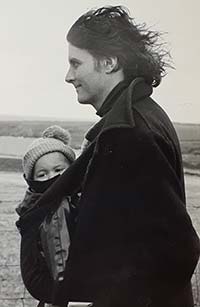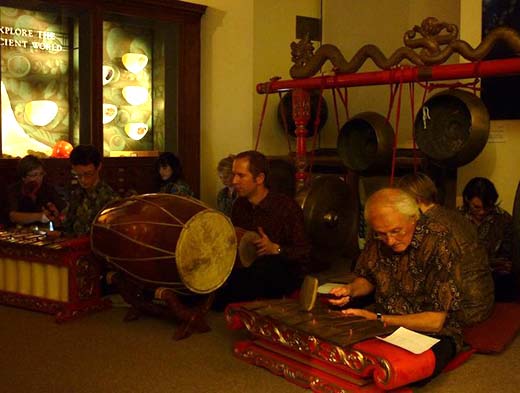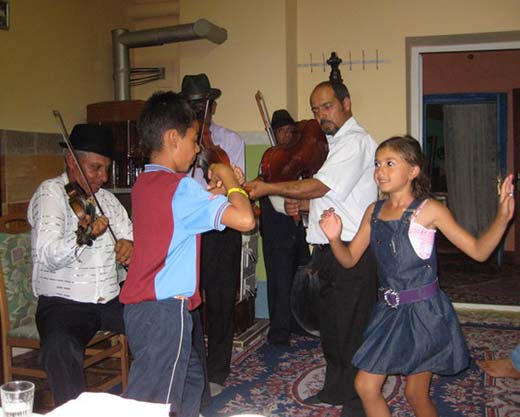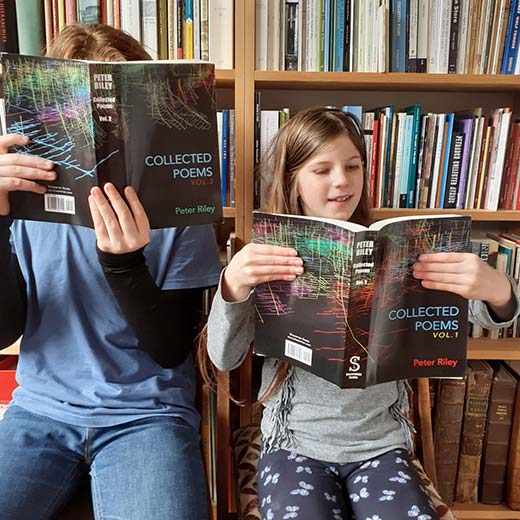
Peter Riley
Local writer and storyteller, George Murphy interviews local characters and personalities
Introduction
 I was born in Stockport in July 1940 during an air-raid. From the hospital window you could see Manchester burning. The bombing is what I mainly remember. They came in from the south heading for the transport nexus at Manchester but, it was said, they unloaded unused bombs on Stockport on the way back, and that the aeroplanes’ engines had a “heavy” sound when they were coming in full of bombs, but a “lighter” sound when they were on the way back, and listening to them, this seemed to be true. Because of the war I didn’t meet my father until I was seven, when he finally got back from post-war “mopping up operations” in Palestine. I was sitting on the back doorstep playing with a friend when this man walked in with a kit-bag and said “Which of you is Peter?”
I was born in Stockport in July 1940 during an air-raid. From the hospital window you could see Manchester burning. The bombing is what I mainly remember. They came in from the south heading for the transport nexus at Manchester but, it was said, they unloaded unused bombs on Stockport on the way back, and that the aeroplanes’ engines had a “heavy” sound when they were coming in full of bombs, but a “lighter” sound when they were on the way back, and listening to them, this seemed to be true. Because of the war I didn’t meet my father until I was seven, when he finally got back from post-war “mopping up operations” in Palestine. I was sitting on the back doorstep playing with a friend when this man walked in with a kit-bag and said “Which of you is Peter?”
My parents called themselves “lower middle class”, and my mother aspired to something “better” while at the same time despising it, which sent me out into the world with an uncomfortable mixture of ambition tempered by anxiety about not being good enough. I was at first classed as factory-fodder, but passed the 11+ mainly because I’d heard that if you failed you were sent to a secondary modern, where new boys were initiated by having their heads shoved into the bowls of the school toilets. I reckoned this would probably kill me, having being pushed into the Blue Lagoon paddling pool at the age of 4, so I made some sort of superhuman effort.
Though I took it for granted at the time, there was a lot of performing talent in the family. My “uncle “ (not actually related) Walter was a fine pianist, adept at 1940s hits. His wife Jessie, a tiny woman from Oldham with a piercing voice and thick accent, was a brilliant comic actress. Given a good script she could have an audience helpless. My uncle Norman was a kind of half-jazz pianist who sometimes sat in on professional bands. My father was also a good pianist, indeed gave lessons, but stuck to amateur classical on account of family exceptionality. My mother was ambitious as a solo singer and was a member of the Stockport Amateur Operatic Society whose performances weren’t just replications of successes on the London stage, and weren’t trying to copy something seen on TV, which we had belatedly as my father said he was waiting for colour!
With school, the Peak District, and Manchester I gradually began to occupy an increasingly wider space. My school provided some inspirational teachers: the remarkable art teacher who led groups of boys out on camping excursions: to archaeological excavations at Bakewell, and to the Dolomites and the Pyrenees at a sufficiently slow pace for it all never to be forgotten. And then there was the head of English with his enthusiasm for modern poetry, centred on T.S. Eliot which was more-or -less what I needed at that stage of things.
It was an hour’s bus journey away to the Dark Peak, a tree-less environment created almost entirely by a century of industrial pollution sweeping over in the wind from the surrounding industrial metropoles. Relentless country, shelf plateaus with exposed rock edges, loud streams, bog and gravel, the outcrops on the top of Kinder Scout carved into great whorls and scoops by the grit-laden wind.
Half an hour in the opposite direction was Manchester, where I went for second-hand bookshops, orchestral concerts and frothy coffee. With a very low budget I was able to accumulate the basis of a contemporary poetry collection, much of which I still possess. And not forgetting the Manchester Experimental Theatre Club where I was to discover categorically that acting was not my forte.
Then suddenly in the middle of all this I was at Cambridge University. I didn’t quite know how that had happened but it was like suddenly being in a fog on the top of Kinder Scout at night. The immediate assumption was that there had been some terrible administrative mistake which would be found out at my first attempt to speak.
Poetry moved to a central position when I was about 17. It became my career (lacking that one essential ingredient – an income) and all the special interests and activities I developed were fed into it – archeology, music globally from folk to free-jazz, Peak District lead mining…. Places as well, some lived in, some frequently visited, have worked their way into the poetry, the Llyn Peninsula and Transylvania being the most carefully researched, with writing on Transylvania including two prose books.
The income had to be gleaned from other sources to contribute my share to the family economy. I was an encyclopedia researcher and fountain pen salesman in London, bus conductor and postman in Hastings, language teacher in Brighton and Hove, Lecturer in English in Denmark, music teacher in Macclesfield…and finally located a sort of synthesis which married together the poetry and an albeit modest income: running a second hand mail-order poetry catalogue; this was in Wirksworth and then Cambridge. It took me all over England and sometimes further, raiding second-hand bookshops.
After all that we came to Hebden Bridge in 2013, ostensibly because of daughter and family a short walk away and son and family in Liverpool. But I had known about the town for a long time as a busy, enterprising sort of place, a place where things happened, including poetry.

Above: with the Cambridge Gamelan band
Peter Riley Q&A
When The Picture House was open, what was the last good film you saw?
Uncle Vanya, a film of the stage production, and some time before that A Pigeon Sat on a Branch Reflecting on Existence (worth it for the title alone).
Has your childhood enjoyment of home-made and local entertainment had a lasting influence on you?
It helped to establish music as a normal and important part of family life which I pursued in many directions, initially mostly classical as I had free tickets to the Halle orchestra in Manchester (through a friend’s father), and music education in school was entirely classical. I taught myself the history of classical, jazz and folk and took pleasure in listening to what was then the most remote music, like Chinese or gamelan. (Many years later I played in the Cambridge gamelan until sitting cross-legged became too much of a contortion). It was when I witnessed social music of high quality, functioning in its own milieu (which is why we kept going to Transylvania) that I realised I had lived through a big cultural change. We now got our music by pressing buttons, which meant a far wider scope but at the loss of immediacy. There are ways of getting immediacy back into music and poetry. In principle it involves having no truck with either elitism or populism.
One of your many jobs included teaching music in Macclesfield. Were you an accomplished musician?
I studied music to scholarship level and so had enough theory to teach “O level” music. No, I was not an accomplished musician but reached the heights of first cello in the Stockport Youth Orchestra and was a reasonably proficient pianist. I played well enough to be able to enjoy it and badly enough to be in awe of those who had the skill and determination to become working musicians. What I cultivated was the art of listening and I tried to apply this to the teaching of the appreciation of music in a liberal studies course at a CFE, with mixed reactions.
What do you look for in a good holiday?
The chance to experience societies, landscape, politics, art, music…different from ours, or closer to home, magnificent coastlines. The Llyn Peninsula has been a regular holiday destination since 1977 when Kathy our daughter was nine months old. She now goes regularly with her two children along with my son Barny (from my first marriage) with his family, and we stay nearby. It is a place close to our hearts and family history.
We always spend a huge amount of time in researching and planning our holidays but the real joy is not in all the planned and hoped for experiences but in the surprises and pure chance encounters, so what begins as a walk through an isolated Romanian village, given the hospitality on one side and curiosity on both, we never know where we’ll end up; on one occasion a whole band including a double bass piled into our van which had had a persistent clutch problem since Dover, for a lift to a neighbouring village for an evening dance at which they were the main attraction. The same clutch problem caused us to arrive on a Sunday morning instead of the Saturday night at another village where by pure chance a great convocation of local musicians and the well-known Hungarian band Muszikas had played late into the night. As a compensation we were invited into the house of the teacher (who doubled as a dancer) for breakfast. We arrived in another village, known for its band, only to discover that they were on tour playing in the Barbican in London that night. There is a lot of luck involved – being in the right place at the right time.
Our holidays whether in town or countryside have always entailed a lot of walking but recently this has had to be much curtailed (see below) so we are still working on trying to find a compromise which can meet our needs.

Above: with Romanian musicians
What is a ‘Cambridge poet’?
Anyone who is a poet in Cambridge. But the term (usually “Cambridge school”) has got attached to a bunch of a dozen or so poets, of which I was one, who got to know one another and took one another’s work seriously enough to find a common purpose. It wasn’t entirely academic, and you didn’t have to live in that intense but damp city but it did involve seeking a language use in poetry that did more than just talk at the reader. It was an intellectual version of the many outbursts of artistic rebellion in the 1960s and 70s against formal rigidity or domestic complacency. It was all a quest for an expansion of culture beyond what we inherited, without losing authenticity. Some smoked unusual weeds; we read books about Siberian shamanism. Some people, of course, did both.

How has the poetry world changed?
We’ve moved a long way from the small press poetry world with fingers permanently stained by the ink from Gestetner machines and Repetitive Strain Injury from operating long arm staplers producing experimental poetry that we thought would change the world, or at least poetry… to a world of poetry prizes, poets in residence, glossy productions of first books and creative writing courses. By the time I was short-listed for the Forward Prize, (the only time I made it to the stage of the Royal Festival Hall) I was an old white male with a walking stick and not in with a chance! But things move on.
How has a return to the north influenced your writing?
I didn’t know what to expect. The more relaxed atmosphere after the theoretical demands of Cambridge gave me some impetus I think, and access to a vocabulary of local names and histories which are still part of the present tense. And it is to some extent home ground, my father’s family having allegedly arrived from Ireland with the horse trade and some members of the family becoming tenant farmers in the hills above Halifax.
And it is refreshing to share a stage now and then with authors of comic monologues, nonsense joke verses, confessional poems, guitar ballads.
You have Parkinson’s Disease. What were your early symptoms? How has the disease affected you?
It kind of creeps up on you. You find you’re ageing more quickly than you expected to. After about seven years of it, my walking limit is now about 3 miles on a good day and I walk slowly. So what it mainly does generally now is slow me down, especially in fine motor skills so using a computer keyboard is laborious and produces a lot of mistakes. So does playing the piano. There are all sorts of associated aches and pains and although I don’t have a tremor, I do experience a certain amount of involuntary movement especially in the evenings.
Mentally, I am able to do the things that I am well familiar with like writing poetry or poetry reviews, but I have some problems in processing new information such as what I’m doing next Wednesday. And because of its influence on the facial muscles, I tend to go around the place looking like an escaped zombie. But I am lucky as I have a fairly mild version of the disease and so far the medication has been effective.
What first attracted you to improvised music and poetry?
Following a trail, following what seemed to be the most interesting areas of modern composed music, especially atonal music - I think it’s rather sad that the BBC has decided otherwise - and finding that improvisation was, for some very talented musicians, the next step. Plus bringing in a spontaneity inherited from jazz. By getting to know the guitarist Derek Bailey, I was able to understand better the performative attitude, in his case, uncompromising. Anyway, I was always interested in reaching beyond the limits. If music, then all music including whatever goes on these days in Sidi Barrani or Bacup.
If you were marooned on an island, as in Desert Island Discs, which book would you choose, if only one could be salvaged from the wreckage? If the BBC offered you The Bible and a Complete Shakespeare, would you accept them or ask for alternatives?
I’ll take the Shakespeare. The Bible would have to be the Tyndale version,1526. For the third book I could think of hundreds, but it would be good to have Black Lamb and Grey Falcon by Rebecca West (1942) to remind me what it was like being “European”. At 1200 pages in two volumes it would keep me well occupied for a long time.
How have lockdowns in Hebden Bridge been for you and your bubble?
For me initially, it seemed to make very little difference. I was able to carry on with my usual activities. It’s when you just don’t want to do any more of the things you’ve always done and have been doing all day long – reading, writing ,watching screens, listening to music, rearranging the library…
Contact with children and grandchildren has been greatly limited. We’ve seen the Liverpool family only once on our annual holiday with our Hebden family as well, on the Llyn Peninsula last August. With a certain amount of relaxation owing to the vaccine, we’ve spent 2 lovely bubble weekends with the Hebden family in our house. But we appreciate we are much luckier than many, having family nearby and living in a place like this.
If it could be arranged, what favourite meal and venue would you choose post lockdown?
Marco’s pizza with family; Leila’s Kitchen with friends or one of the original curry places in Bradford .
Looking back, who would you most like to thank?
All those fine musicians, poets, and others, who tolerated my interventions.
To whom would you most like to say sorry?
The younger population of the British Isles, for having made such a mess of opposition, as to get us stuck with extremely bad politics. But there is every hope that they will do better than us.
Back to that desert island … please choose your favourite short piece of music to play us out.
More HebWeb interviews from George Murphy
If you would like to send a message about this interview or suggest ideas for further interviews, please email George Murphy

